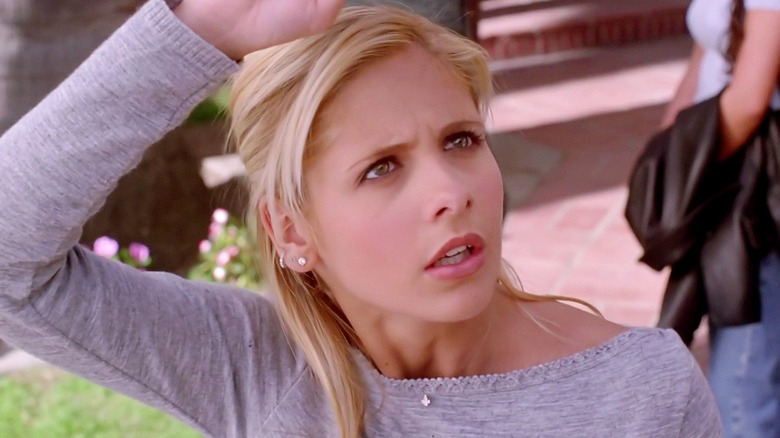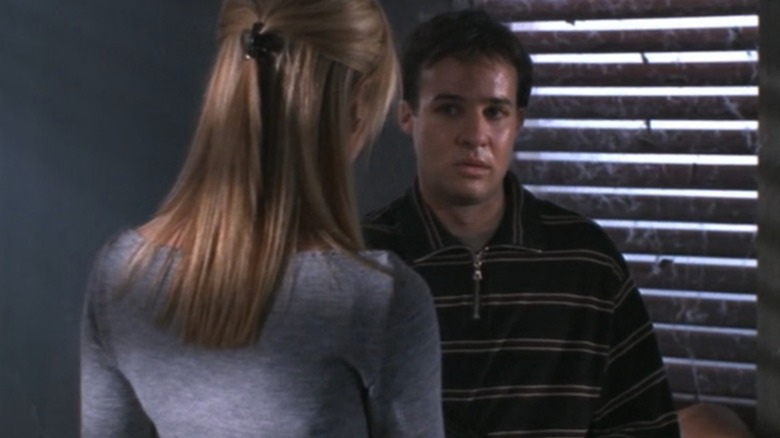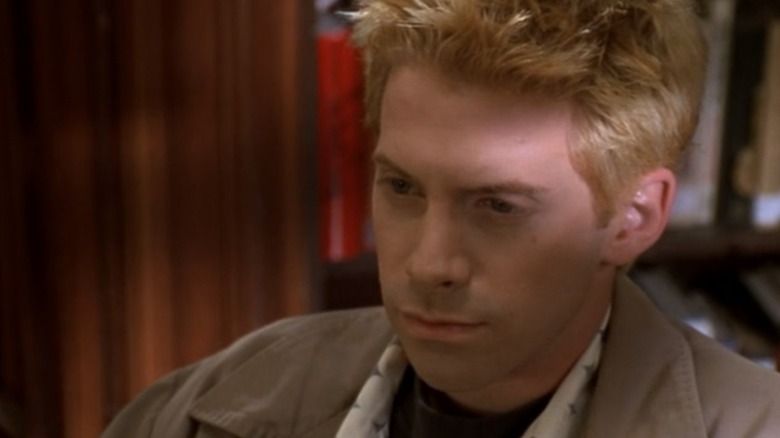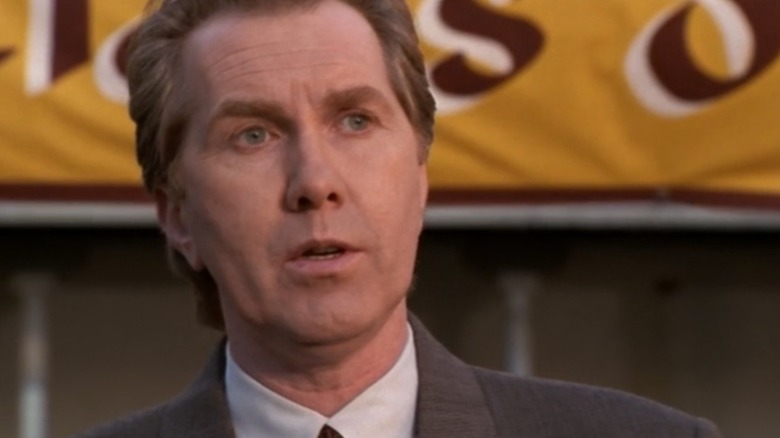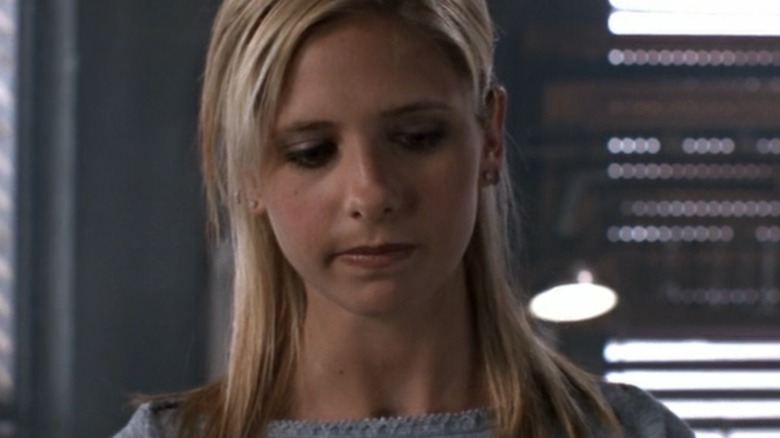WB Made A Controversial Choice To Shelve These Buffy The Vampire Slayer Episodes In 1999
For as long as TV has existed, it has been used as a scapegoat for social and cultural issues. In a 1961 speech, FCC chairmen Newton Minow declared the format a "vast wasteland" of programming. In the 1970s, dozens of CBS affiliates chose not to show the historic episode of "Maude" that tackled abortion in reruns, caving to the pressure of critics who thought it would encourage viewers to do the same. The '80s saw the Satanic Panic, in which TV at large got swept up in a whirlwind of conspiracy, cited alongside metal music and board games as negative influences on the state of American children's souls.
Then there were the '90s. While the paranoid attitudes behind the Satanic Panic still raged on in some households, America became gripped by an unimaginable and seemingly new phenomenon: the school shooting. A few school shootings had happened before the 1990s, but this was the decade scarred by particularly harrowing and deadly shootings – the Columbine massacre chief among them.
It's no surprise, then, that immediately after two teenagers killed 13 students and teachers before ending their own lives, many citizens' thoughts turned not to gun control or mental health care, but to television. This time, "Buffy the Vampire Slayer" became a somewhat voluntary scapegoat, as two episodes of the hit teen show's third season were left off the primetime schedule in the wake of the Columbine killings.
A school shooting plot turned out to be poorly timed
The first sidelined episode, "Earshot," was due to air a week after the Columbine massacre, but its network WB pulled the hour in the wake of the shooting, with a spokesperson telling E! News, "This is something we need to do." Their choice was voluntary, and actually made some sense: the episode in question was a case of eerie timing, as it did feature a plot in which Buffy (Sarah Michelle Gellar) and the Scoobies attempted to thwart what they thought was a school shooting. When Buffy began hearing her classmates' thoughts, she overheard one voice think, "This time tomorrow, I'll kill you all." Ultimately, she found her classmate Jonathan (Danny Strong) in the school's clock tower with a rifle, but he had actually planned to kill himself. It turned out it was the school's deranged lunch lady who had plans to murder the kids — via rat poison.
In the wake of Columbine, America was on edge, in fear of copycat killers who would see what the perpetrators did and attempt their own similar massacre. Ironically, news coverage of the incidents shared more gory details about school shootings with the world than "Earshot" ever would have, but for network execs, it was better safe than sorry. Plus, the timing might have simply felt like poor taste to the powers-that-be. "It's not appropriate at this time," E! cited YTV's Laura Heath as saying. "Our programming people are parents and it's just, as a parent, it would be offensive to air something like that."
One Buffy star had some choice words about the delay
At the time, "Buffy" star Seth Green told Entertainment Weekly he agreed that airing "Earshot" "would have seemed really callous and inappropriate," but he also shared some insights about the sense of misdirection that came with putting the onus for change on television. In a statement to EW in 1999, Green said:
"Instead of focusing on the real issues and the fact that guns are so easily and readily available to kids and that people aren't watching their kids carefully enough or monitoring the emotions of their students, they'd rather say, 'Ooooh, that guy's got a mohawk,' or 'That guy's got a leather jacket on, and "Natural Born Killers" is a film I don't like, and Marilyn Manson scares me,' so all that s*** should be put on a funeral pyre.'"
As Green put it, if "you can have 10,000 kids watch 'Natural Born Killers' and only one or two is going to go shoot people," there are other problems at play. In fairness to concerned parents and the powers-that-be at the WB, unprecedented national tragedies often leave most of us flailing around in hopes of finding something to do to help. On-screen violence is by no means the main or only factor leading to America's problems with mass violence, but if there was a chance that postponing an episode of TV could stop a copycat situation, I get why some people at the time were willing to try.
A second postponement was much more controversial
While the "Earshot" postponement was understandable, "Buffy the Vampire Slayer" was soon subjected to a second, much more polarizing episode shelving. The network replaced "Earshot" with a rerun (it would eventually air in September, after the rest of the season), but after airing three more regular season episodes, it once again decided to pull one from the air. This time, it was "Graduation Day (Part 2)," the second half of an epic finale that saw the Sunnydale students facing off against their monstrous mayor (Harry Groener). This decision was a bit of a head-scratcher; it was set to air a month after Columbine, and didn't actually include anything that would remind viewers of a real-life school shooting. It did feature students carrying weapons and building a bomb — but it was all done to fend off a giant, supernatural lizard.
Needless to say, the "Graduation Day (Part 2)" benching did not go over well. Salon quoted then-WB president Jamie Kellner's statement to the Associated Press as saying, "Given the current climate, depicting acts of violence at a high-school graduation ceremony, even fantasy acts against a 60-foot serpent and vampires, we believe, is inappropriate to broadcast around the actual dates of these time-honored ceremonies." Salon's Charles Taylor also notes that Kellner cited a sense of responsibility to the network's younger audiences. Brad Turell, then senior VP of WB's publicity, put it a bit differently to Entertainment Weekly: "If anything [violent] had happened at any graduation anywhere, every news organization would've run 'Buffy' clips."
The episode delays inspired a fan movement
Whether the choice to pull the "Buffy" finale was made out of respect, self-interest, or some combination of the two, it's clear that it was unpopular among fans, celebrities, and pundits. Jon Stewart spoke about it on "The Daily Show," Salon's Taylor excoriated the WB for "breaking faith" with clever audiences whom the show has always trusted to understand its take on violence before, and EW even noted that Elvis Costello made a jab at the network on stage during a concert.
Fans didn't take what they saw as an act of censorship lying down. After the episode aired in parts of Canada, bootleg copies began circulating around the world, with Salon noting that some ended up with a hefty $30 price tag. Viewers began setting up protest websites and petitions, as well as sending strongly-worded emails, letters, and even faxes. In an act of coordinated fan support, a group called Stand Up For Buffy raised at least $3000 (per EW) to take out ads in popular trade magazines, with the book "Undead TV: Essays on Buffy the Vampire Slayer" noting that they bought "a full-page ad in Variety condemning the WB for its actions."
For his part, now-infamous series creator Joss Whedon was quoted as encouraging fans to "bootleg the puppy" to USA Today (via EW). Both shelved episodes did ultimately air, but their temporary sidelining stands as a reminder of a bleak time in both American history and TV history – a time that unfortunately doesn't look much different from our reality more than two decades later.
